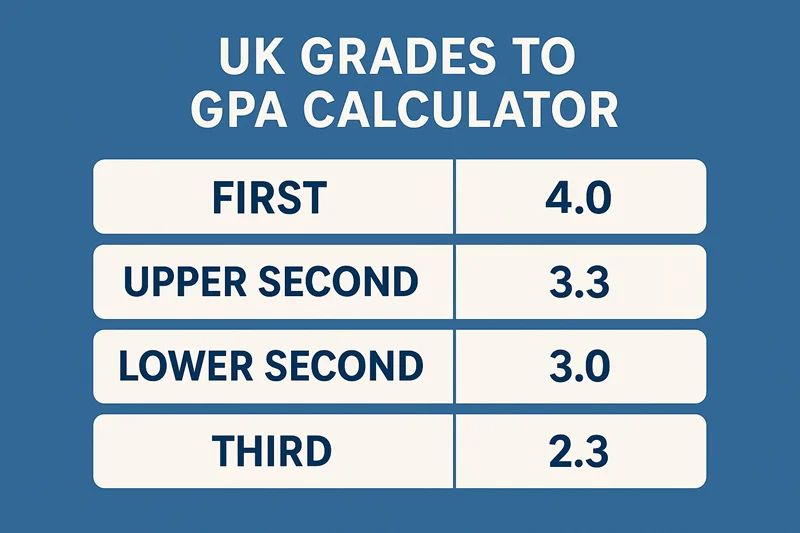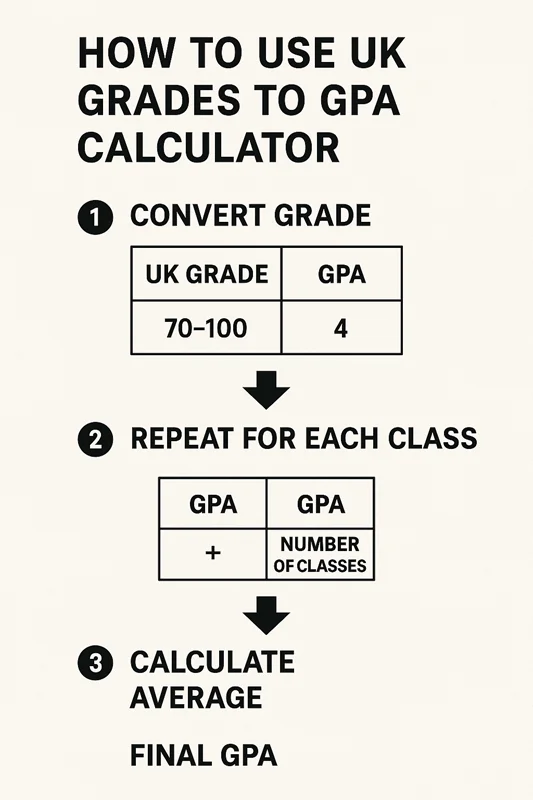Converting UK grades to the American GPA system can feel overwhelming, especially when you’re applying to US universities or comparing academic achievements across different educational systems. Whether you’re a British student planning to study abroad or an American admissions officer trying to understand UK qualifications, this guide will walk you through everything you need to know about UK to GPA conversion.
The UK and US grading systems work completely differently. While the UK uses degree classifications like First Class Honours and letter grades, the US relies on a 4.0 GPA scale. Understanding how these systems translate can make the difference between a successful application and a missed opportunity.
Our interactive calculator instantly converts your UK grades into their US GPA equivalent, taking the guesswork out of the conversion process. Simply input your UK grade or degree classification, and the tool provides an accurate GPA conversion based on widely accepted academic standards.
Sample conversion: A UK First Class Honours degree (70-100%) typically converts to a GPA of 3.7-4.0, while an Upper Second Class Honours (2:1, 60-69%) translates to approximately 3.3-3.7 GPA.
The calculator handles various UK qualification types including A-levels, GCSE grades, and university degree classifications. It also accounts for the different grading scales used across England, Scotland, Wales, and Northern Ireland.
Disclaimer: These are estimates only; always confirm conversions with the specific institution you’re applying to, as different universities may have their own conversion policies.
The UK education system uses multiple grading approaches depending on the level of study and the specific qualification. Unlike the straightforward numerical GPA system used in the US, UK grades can appear as percentages, letter grades, or descriptive classifications.
University Degree Classifications:
A-Level Grades:
GCSE Grades (Current 9-1 System):
Grade 4: Standard pass (equivalent to low C)

UK universities typically use a weighted average system where different modules or courses contribute varying percentages to your final grade. Most institutions require a minimum of 40% to pass, which is significantly lower than the typical 60% passing grade in the US system.
The key difference lies in the grading philosophy. UK universities design their assessments expecting most students to score in the 50-70% range, with marks above 70% reserved for truly exceptional work. This means a 65% in the UK system often represents stronger performance than a 65% in the US system.
Example calculation: If you scored 68% in a final year project worth 40% of your degree, 62% in coursework worth 35%, and 71% in exams worth 25%, your weighted average would be: (68×0.4) + (62×0.35) + (71×0.25) = 65.95%, resulting in a 2:1 classification.
Scotland uses a slightly different system with Honours classifications ranging from First Class to Pass, but the percentage boundaries often differ from the rest of the UK. Some Scottish universities use a 22-point scale for individual courses before converting to the final degree classification.
Professional qualifications like those from chartered institutes often use Pass/Merit/Distinction classifications, while vocational qualifications might use Competent/Not Yet Competent or similar descriptive grades.
UK Grade | UK Percentage | US GPA (4.0 Scale) | US Letter Grade |
First Class (1st) | 70-100% | 3.7-4.0 | A/A- |
Upper Second (2:1) | 60-69% | 3.3-3.7 | B+/A- |
Lower Second (2:2) | 50-59% | 2.7-3.3 | B-/B+ |
Third Class (3rd) | 40-49% | 2.0-2.7 | C/B- |
Pass | 35-39% | 1.7-2.0 | C-/D+ |
A* | 90-100% | 4.0 | A+ |
A | 80-89% | 3.7-4.0 | A |
B | 70-79% | 3.3-3.7 | B+ |
C | 60-69% | 3.0-3.3 | B |
D | 50-59% | 2.3-2.7 | C+ |
E | 40-49% | 2.0-2.3 | C |
Different countries and regions interpret UK grades differently when converting to their local systems, and understanding these variations is crucial for international applications.
US institutions typically use established conversion tables provided by organizations like the National Association of Credential Evaluation Services (NACES). Most American universities consider a UK 2:1 equivalent to a 3.3-3.7 GPA, which meets the minimum requirements for most graduate programs.
However, highly competitive programs at top-tier universities often require the equivalent of a UK First Class Honours for admission. Some US schools also request official credential evaluations from agencies like World Education Services (WES) or Educational Credential Evaluators (ECE) rather than accepting self-reported conversions.
Canada generally follows similar conversion principles to the US but with some variations. A UK First Class Honours typically converts to an A grade (4.0 GPA), while a 2:1 converts to a B+ (3.3-3.7 GPA). Canadian universities often have more flexible conversion policies and may consider the reputation of the UK institution when evaluating grades.
Provincial differences exist across Canada, with some provinces using percentage-based systems alongside GPA conversions. For example, Ontario universities might convert a UK 2:1 to 75-84% alongside the GPA equivalent.
Understanding UK to GPA conversion is essential for multiple academic and professional scenarios. The accuracy of your conversion can directly impact your opportunities for further education, career advancement, and international mobility.
Graduate School Applications: Most US graduate programs have minimum GPA requirements, typically ranging from 2.75 to 3.5 depending on the program’s competitiveness. Knowing your converted GPA helps you identify realistic target schools and avoid wasting application fees on programs where you don’t meet the academic threshold.
Scholarship Opportunities: Many international scholarships require specific GPA minimums. The Fulbright Program, for instance, often requires a 3.0 GPA equivalent, while competitive merit-based scholarships may require 3.5 or higher.
Employment Screening: Multinational companies increasingly use standardized criteria for international hires. Some employers, particularly in consulting, finance, and technology, use GPA cutoffs during initial screening processes.
Professional Licensing: Certain professional qualifications in the US require specific academic credentials. For example, some CPA programs require a minimum GPA for admission, making accurate conversion crucial for career progression.

No single official standard exists, which is why conversion can be challenging. Different US institutions, credential evaluation services, and professional organizations use varying conversion scales. The most widely accepted conversions come from established credential evaluation agencies like WES, ECE, and AACRAO, but even these can differ slightly. This is why many universities require official credential evaluations rather than accepting self-reported conversions.
Our tool uses conversion scales based on widely accepted academic standards and data from major credential evaluation services. However, accuracy depends on several factors including your specific institution's reputation, the degree subject, and the receiving institution's policies. The tool provides estimates that work for most general purposes, but always verify with your target institution for critical applications.
Most US universities accept UK qualifications, but they may have different conversion policies or requirements. Some schools use their own internal conversion charts, while others require third-party credential evaluations. Elite universities often have more stringent requirements and may place greater emphasis on the reputation of your UK institution alongside your grades.
This depends on your specific needs. For graduate school applications, converting your overall degree classification is usually sufficient. However, some programs may require course-by-course evaluations, especially for professional programs like medicine, law, or engineering. Check with your target institution about their specific requirements.
Scottish Highers, Welsh Baccalaureate, and Northern Irish qualifications each have their own conversion considerations. Our tool accounts for these regional differences, but for critical applications, consider getting a professional credential evaluation that specifically addresses your qualification type and region.
Converting UK grades to GPA doesn’t have to be complicated when you have the right tools and information. Our calculator provides reliable estimates based on established academic standards, but remember that each institution may have its own specific requirements and conversion policies.
Try our calculator to get an instant estimate of your GPA conversion, but always verify the results with your target institution or consider getting a professional credential evaluation for critical applications like graduate school admissions or professional licensing.
For the most accurate conversions, especially for competitive programs, we recommend using official credential evaluation services like WES or ECE. These services provide detailed, institution-specific evaluations that carry more weight with admissions committees and employers.
Download our comprehensive conversion chart for offline reference, and bookmark this guide for future use. Understanding your academic standing in different systems opens doors to international opportunities and helps you make informed decisions about your educational and career path.
Remember, grades are just one part of your application. Strong personal statements, relevant experience, and compelling recommendations can often outweigh minor differences in GPA conversions. Focus on presenting a complete picture of your academic and personal achievements alongside your converted grades.